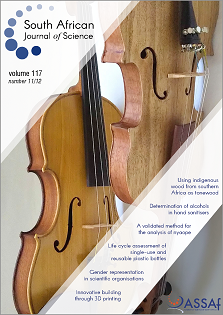Self-esteem and antiretroviral therapy adherence among young people living with HIV: An exploratory serial mediation analysis
DOI:
https://doi.org/10.17159/sajs.2021/8354Keywords:
adolescents, young adults, HIV, HIV/AIDS stigma, body perceptions, medication adherenceAbstract
Capitalising further on the benefits of antiretroviral therapy (ART) for individual treatment requires an improved understanding of the psychological processes that may affect optimal ART adherence among people living with HIV. We examined internalised HIV/AIDS-related stigma and body appreciation as mediators of the association between self-esteem and ART adherence among young people living with HIV (YPLHIV). A sample of 76 YPLHIV (Mage = 19.36, s.d.age = 2.56; male 56.58%) residing in an HIV hyperendemic region of South Africa completed self-report measures of self-esteem, internalised HIV/AIDS-related stigma, body appreciation, and ART adherence. Path-analytic mediation modelling was performed to test for direct and indirect effects linking self-esteem with ART adherence. Results of serial mediation analyses indicated that self-esteem and ART adherence were indirectly associated through a two-step path of internalised HIV/AIDS-related stigma and then body appreciation, as well as a one-step path through internalised HIV/AIDS-related stigma. The results provide preliminary support for internalised HIV/AIDS-related stigma and body appreciation as mechanisms underlying the association between self-esteem and ART adherence. Implications of the findings for promoting ART adherence among YPLHIV are discussed.
Significance:
- Self-esteem and ART adherence were indirectly related through internalised HIV/AIDS-related stigma followed by body appreciation.
- Outcomes of intervention initiatives designed to promote ART adherence among young people living with HIV may be further improved by integrating components that target internalised HIV/AIDS-related stigma and body appreciation.
Published
Issue
Section
License

All articles are published under a Creative Commons Attribution 4.0 International Licence
Copyright is retained by the authors. Readers are welcome to reproduce, share and adapt the content without permission provided the source is attributed.
Disclaimer: The publisher and editors accept no responsibility for statements made by the authors
How to Cite
- Abstract 793
- PDF 794
- EPUB 256
- XML 259












.png)